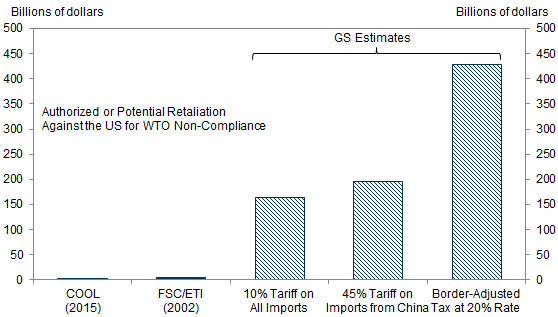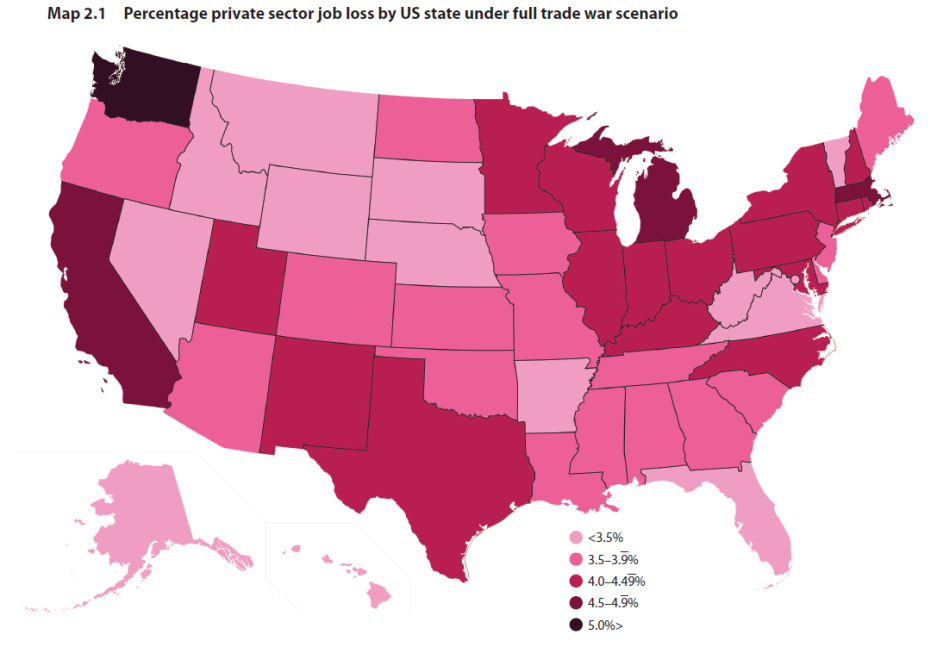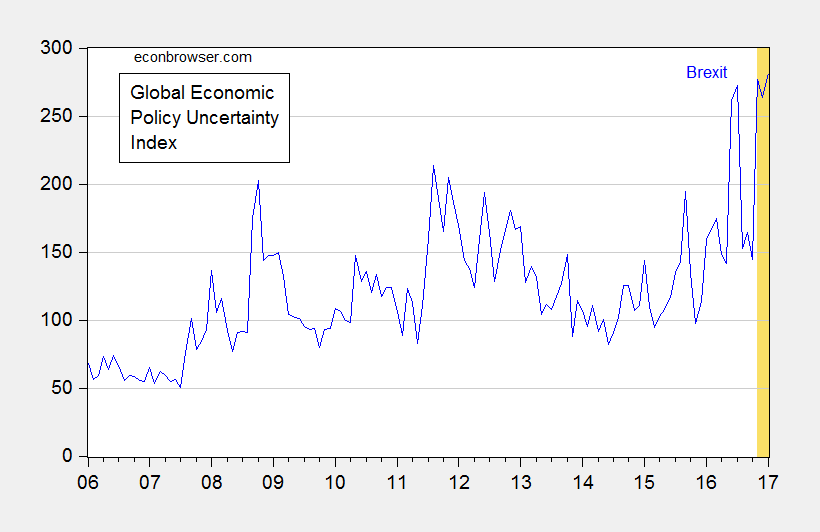The Administration rolled out a new trade strategy yesterday (The President’s 2017 Trade Policy Agenda, part of this document). Like many things the Administration has put forward, it is heavy on rhetoric, light on policy specifics. That being said, if the Administration pursues a trade agenda that invites trade retaliation, while implementation of stimulative macro policies (e.g., infrastructure investment, tax cuts) are delayed, then we may very well get an economic slowdown before a boom.
From the document:
“It is time for a more aggressive approach. The Trump Administration will use all possible leverage to encourage other countries to give U.S. producers fair, reciprocal access to their markets…”
From WaPo:
The new trade approach, which was sent to Congress Wednesday, could affect businesses and consumers worldwide, with the White House suggesting the United States could unilaterally impose tariffs against countries it thinks have unfair trade practices — paving the way for a more adversarial relationship with China and other trading partners — and punish companies that relocate overseas and then attempt to sell products on the U.S. market.
…
Trump’s threatened tariffs and other trade barriers could violate WTO rules and bring blowback from other countries in the trade organization. But the agenda signals the Trump administration could simply ignore those complaints.
…
Chad Bown, a senior fellow at the Peterson Institute for International Economics, said he fears the administration’s criticism of WTO rules could end up creating a more lawless global system. “The difficulty is, once we step away from that and say the WTO rules imply a lot more flexibility in what we’re allowed to do, we can be 100 percent certain other countries will start to do the same. That’s what will ultimately undermine the U.S. system, and there will be big repercussions for U.S. exporters.”
So retaliation is a distinct possibility. The amount of the potentially authorized retaliation against the U.S. is not trivial. From Mericle and Phillips, “US Daily: Trade Disputes: What Happens When You Break the Rules?” Goldman Sachs, February 17, 2017 (not online):

Exhibit 3 A WTO Case against Recent US Trade Policy Proposals Would Likely Be Unprecedented in Size. Source: Mericle and Phillips, “US Daily: Trade Disputes: What Happens When You Break the Rules?” Goldman Sachs, February 17, 2017 (not online), based on data from World Trade Organization, Goldman Sachs Global Investment Research.
Frankly, I didn’t even contemplate the fact that the amounts could be so large…
From the GS Note:
How such a scenario would play out is extremely uncertain. But in light of the magnitude of the potential violation, the likelihood that a WTO case would be lengthy, the fact that authorized penalties would not be retroactive, and the domestic political pressures that would quickly mount, press reports suggesting that the EU, Mexico, and China would likely respond quickly are unsurprising. It is difficult to know how President Trump might react to an adverse ruling from the WTO, an organization he has called a “disaster,” or to foreign retaliation. But reversing a large tariff, let alone a fundamental corporate tax reform, would be difficult politically, raising a risk of escalation that could undermine current multilateral trade agreements.
By the way, I have not discussed the macroeconomic impact of a full-fledged trade war (see here). Here’s a depiction of the impact on employment, state-by-state.

Source: Marcus Noland, Gary Clyde Hufbauer, Sherman Robinson, and Tyler Moran, “Assessing Trade Agendas in the US Presidential Campaign,” PIIE Briefing 16-6 (September 2016).
And, for all those people who bemoaned policy uncertainty as slowing down economic growth, over the past eight years, something to consider — again from WaPo:
Stan Veuger, a resident scholar at the American Enterprise Institute, said the administration’s plan to continually reevaluate existing trade relationships could end up disrupting American business.
“All those things together create a system where the U.S. government may intervene in arbitrary and unpredictable ways in trade relationships, and I don’t think that kind of framework is very helpful for the creation of lasting, worthwhile relationships between firms in the U.S. and firms abroad,” he said. “It just makes the business environment more uncertain.”
Here is the Baker, Bloom and Davis measure of global economic policy uncertainty through January 2017.

Figure 1: Global Economic Policy Uncertainty Index, Market GDP weights (blue). Orange denotes post-election period. Source: Policyuncertainty.com, accessed 3/2/2017.
So, I’m sure there is something satisfying to some people about threatening our trading partners. It might all work out very well for the U.S. (we are a large country in international trade, so we can certainly pressure our partners effectively). But then it might not.
Those who wonder where the title of this post comes from, let me refer the reader to this article. It is important to remember the question is posed twice in the movie, with two different outcomes. In the second event, the person does indeed feel “lucky”, with the person in question consequently experiencing a sub-optimal outcome.
For a long time after WWII, Japan had a convoluted system in place that essentially blocked many products from the U.S. by requiring a labyrinth of inspections and permits… even down to individual items such as an automobile. Later, South Korea followed suit: http://articles.latimes.com/1990-12-31/business/fi-5690_1_south-koreans-comic-book-south-korea-s-alleged-campaign although, like Japan, that practice has lessened.
Trump’s focus on China is somewhat misplaced in that regard. The U.S. government and businesses specifically enabled China to become the supplier of our “trinkets and trash” and then more sophisticated products as they moved from 19th century production methods to the 21st century. Cheap labor was irresistible to business and moving dirty manufacturing out of the U.S. was irresistible to environmentalists and their sympathizers in government… let U.S. manufacturing die on the vine because we had “intellectual property”. Of course, now IP is being attacked as “unfair”.
Trump can’t fix what decades have built or destroyed from different perspectives. All Trump can do is make U.S. companies more effective with policies that assist rather than obstruct their global competitiveness. With the present and future levels of automation, labor costs are become less of a factor.
I actually don’t really understand what it means to “win” in trade negotiations. The US simply doesn’t produce much that other countries want (not least because they don’t adhere to international standards – such as the metric system). It just seems to me that increasing trade barriers to foreign goods will increase the cost of some goods to American consumers and probably end up costing US exporters market share to the benefit of import competing firms. i.e. Some Americans will and some win. The country as a whole?
Reason,
you wrote “The US simply doesn’t produce much that other countries want (not least because they don’t adhere to international standards – such as the metric system).”
A little perspective; as you probably suspect, China exports the most (over 2 trillion). The US is second, more than 1 1/2 trillion. The world wants our stuff a whole lot. And with a large reduction in corporate tax, the world will at the margin, want our stuff a lot more.
Ed
Reason,
you wrote “The US simply doesn’t produce much that other countries want (not least because they don’t adhere to international standards – such as the metric system).”
A little perspective; as you probably suspect, China exports the most (over 2 trillion). The US is second, more than 1 1/2 trillion. The world wants our stuff a whole lot. And with a large reduction in corporate tax, the world will at the margin, want our stuff a lot more.
Ed
Trump’s America First reminds me of the old import substitution, economic development strategy that was popular several decades, notably in Latin America. Import substitution only had limited success, especially compared to the export led model followed in East Asia. Import substitution tended to produce fragmented, inefficient and low productivity industries protected from competition by high tariffs and other trade barriers.
Take autos, for example. It does not take all that much more labor to build a $60,000 or a $30,000 car than a $15,000 light vehicle. But nobody can profitably produce a $15,000 car or light truck with expensive American labor. But that is exactly what Trump is asking Detroit to do. I suspect the auto CEOs told Trump what he wanted to hear and returned home and did nothing. That seems preferable to building some unprofitable white elephant.
I think Trump’s game plan is to convince US manufacturers and Foreign Multi-nationals that by imposing a ‘border tax’ it will cause any items they import to become more expensive and to make these manufacturers less competitive or less profitable. Their other option is to locate manufacturing of the imported item(s) back into the U.S. In this way, Trump is hoping to increase employment. I’m a more than a little doubtful that this strategy will work.
Menzie, is James alright ?
Long time no word from him.
I’ll bet JDH is working on his NCAA tourney brackets.
That must be true, how could I have missed that !
Bet, that was also mentioned on TWITTER ..
Trump this morning: “Ahh, but the strawberries that’s… that’s where I had them. They laughed at me and made jokes but I proved beyond the shadow of a doubt and with… geometric logic… that a duplicate key to the wardroom icebox DID exist, and I’d have produced that key if they hadn’t of pulled the Caine out of action.”
Oop, sorry that was Captain Queeg.
Trump actually said: “How low has President Obama gone to tapp my phones during the very sacred election process. This is Nixon/Watergate. Bad (or sick) guy! … I’d bet a good lawyer could make a great case out of the fact that President Obama was tapping my phones in October, just prior to Election!”
At what point does Mike Pence take out a copy of the 25th Amendment, Section 4 and begin to draft a letter to Congress “It is my unfortunate duty to inform you that …”
Oh, and Trump finishes off his 3 AM paranoid accusations with a rant about whether he or Arnold Schwarzenegger got higher ratings on the Apprentice reality TV show.
Is this the real world? Can this man really be President? Is this guy full on crazy?